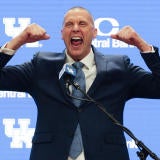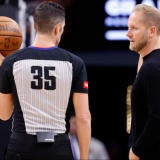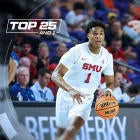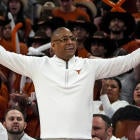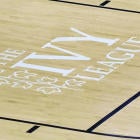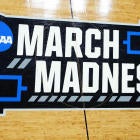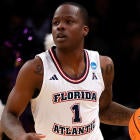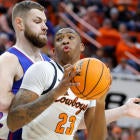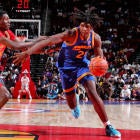CBS Sports college basketball writers Gary Parrish and Matt Norlander spent July on the road talking to college coaches at multiple major NCAA-sanctioned recruiting events. In the weeks since, they've followed up with more than 110 coaches at all levels of Division I for our annual Candid Coaches series. As always, the series features a fun array of questions about college basketball, but also touches on broader issues in society. In exchange for complete anonymity, they give us unfiltered honesty. Throughout August we'll be posting the results of the poll questions posed to coaches.
This Candid Coaches question was sparked by multiple events that happened in July, national horrors that ran parallel to something much less important: the live period for college basketball recruiting. As coaches were on the road, two separate incidents, the killings of black men Alton Sterling and Philando Castile by police officers, in addition to the murders of police officers in Baton Rouge and Dallas, prompted plenty of conversations among coaches, specifically black coaches, and the current state of American relations between citizens and law enforcement.
In many ways, sitting in a gym for upward of 10 hours a day felt hollow amid such tragic national news. Many coaches I spoke with were moved to lament or discuss the problems, and in the process, tell some of their own stories of how they'd been treated unfairly by police in the past. A couple of incidents happened as recently as this summer.
Men in their late 30s and 40s, employed by colleges as basketball coaches, are still afraid of being pulled over by the cops for fear of what could come next.
Just this July, while in Las Vegas for recruiting, one black coach told me he was stopped by police and immediately couldn't help but be extra cautious and extra courteous.
"I was pulled over," he said, "and felt uncomfortable to grab my registration or license due to what has been going on across the country."
Another black coach this summer had his wife talk him out of driving 120 miles overnight from the Peach Jam in Augusta, Ga., to another recruiting event in Spartanburg, S.C. With the Sterling and Castile killings having just happened, she insisted he instead get up early and make the the drive in daylight.
With this in mind, we polled nearly 50 African-American coaches and more than 60 white coaches.
Have you ever had an uncomfortable or inappropriate encounter with a member of law enforcement?
Black coaches responded
| YES | 68 percent |
| NO | 32 percent |
White coaches responded
| YES | 12 percent |
| NO | 88 percent |
Note: Nearly half of the white coaches polled who responded "yes" said as much because they were among African-American friends and/or teammates at the times of their negative run-ins with police officers.

QUOTES THAT STOOD OUT
All quotes are from African-Americans unless otherwise noted.
- "Yes, I have them every day. It's called being black."
- "Yes, my first encounter with the police was finding out they were on the local drug dealer's payroll in my neighborhood. My second encounter was having my money taken away from me by police, after they rode through my neighborhood and saw me counting it when I was 14 years old. I had just finished selling donuts for an AAU trip and they labeled me a drug dealer.
"In 2005, I was followed for five minutes before I was pulled over. They rushed my door, opened my door with guns pulled and grabbed me by my shirt yanking me out of the car. Never asked for license or registration. They asked me to spread eagle on the car and began kicking my ankles to open my legs more. I was immediately forced to sit on a curb in the rain while one cop ran my tags and the other held me at gunpoint. They explained to me that I 'fit the description' of a suspect and they were only doing their job. The only reason I didn't make a big spectacle of the event was because my god-brother was going to be drafted in two months and I didn't wanna cause him any negativity."
- From a white coach: "One time when I was in college I was in a major southern city with my roommate. My roommate is African-American and was driving the car. We got pulled over by the DEA and asked to search our car. My roommate, who is a church minister now, refused to allow them to search his car. The officer, who was African-American, told us if we did not allow him to search our car he would plant drugs on the car and run us in to the station. We agreed to have him search the car and he found nothing but four or five bibles my roommate had in his trunk. That is the only time I have had a run-in with a police officer."
- "Yes, but I've had many more positive interactions. I will say, seeing the actual raw footage of black people being shot over, and over, and over, and over again by police officers does help facilitate a discomfort on occasions when I notice police officers. Given the racial history of our country concerning African-Americans, of course, there are going to be some residual effects. At one point in history, police brutality was very apparent, very rampant, and very real. So I don't think the skepticism from people concerning police is unwarranted. However, I'm never a fan of generalizations about groups of people and it's unfortunate that the many law officers who do their job without bias receive a bad name due to the actions of a few."
- "My first year at [school redacted], I was recruiting in Illinois. I was pulled over on the interstate a couple hours outside of St. Louis. I wasn't speeding but the car -- it was a dealership car -- had temporary tags on it. So they pulled me over and said I changed lanes without a signal, which wasn't true. Once they pulled me over, they ran my license and said it was suspended, which it wasn't.
"Then another squad car came to the scene. They came back, took me out the car, cuffed me, searched the car, my bags, etc. They said I had drugs on me, which wasn't true. I've never used drugs. After they finished, I was arrested and taken to jail. The car was impounded. Once I got to the station, after three hours, I was released with no apology or explanation or anything. By this time, it was after 1 a.m. I walked to a hotel few blocks away, stayed the night, then got my car out of the impound the next morning. ... So every time I get pulled over now, the thought crosses my mind on how I will be treated. I make it a habit now to call my wife or someone close to me if I'm pulled over, just to keep someone in the loop in case something happens."
- From a white coach: "I was once pulled over driving a car with three African-American friends. We were pulled out of the car and questioned for doing absolutely nothing other than driving. Gave me a realistic glimpse into racial disparity."
- "I would say it's happened 20 times. When I first met my wife, I had a brand new car. My wife is a retired police officer herself. But she lived in a community that wasn't diverse. I got pulled over every time I went to her home. At least 20 times, literally."
- Growing up being a man of color I think we all in one form or another experienced profiling. I've had instances of 'rear view light looked out,' 'illegal item hanging from rear view mirror,' 'speeding' as ways to pull me over. I think now it's more of the fear about what happens when I am pulled over, how do I act and behave and how do I let you know as an officer that I will comply with all rules and expectations. Showing license with proof of insurance and doing so without a weapon being show or any type of resistance. The fear of the unkind I think is real. With that being said, I also recognize that there are several law enforcement officers that are great at their jobs and need to be commended for providing their service."
- "Yes. I got pulled over for no reason and jacked up on the hood of my car at 3 a.m. coming back from a recruiting trip."
- "None of the recent incidents of police brutality surprise me. Smartphones becoming common, and the popularity of social media, have made it so these videos are being viewed/circulate more. It also doesn't allow for the media or police to control or edit. As a kid I was handcuffed and held on the side of a curb for 'fitting the description' of someone of interest. As you can imagine, that wasn't done in the most physically comforting manner either. As a teenager, I was pulled over driving back from a basketball game with a friend because a police officer made an illegal U-turn without a signal and I was unable to get out of his way quick enough. He and his partner then pulled us over, sat us on the curb, and illegally searched the vehicle as asking if there were any guns or drugs they should know about.
"As an adult I have also been racially profiled while driving my car in broad daylight to pick up breakfast. I can guarantee there are a number of other coaches across the country who have experienced what I have, or worse. All law enforcement isn't bad, and all these incidents are not as black and white as they seem. However, in impoverished neighborhoods tension between minorities and law enforcement has been high for years. As a young coach, in a profession where the majority of the student athletes are minority, it frightens me to think something like this could easily happened. It has made us have the police chief come in and talk with our student athletes about what to do, how to handle themselves if they are pulled over at a traffic stop, i.e. where to place hands, how to present ID, etc. Just an example of the sign of the times."
- "Not since adulthood. As a young black man, yes. Every encounter with cops in my city was a bad one."
- "Once my wife and I had a tough encounter with police in [city redacted because it's where the coach worked at the time]. She was driving a university-issued car, and we get pulled over for no reason during the day. They didn't give us a reason at all. But we had police come up on both sides of the car. The officer on my side had his hand on his gun. It was a little uncomfortable because my wife didn't have the proper paper work for the car. They eventually let us go. But, needless to say, it was an uncomfortable conversation back and forth."
- From a white coach: "I was the only white guy that played on my high school team, and there were a few times with some of my teammates driving around we were pulled over and harassed. Pulled over for no reason, questioned. So I saw it directly and then have witnessed it several times in a small-school setting with campus police and the natural assumptions that would be made any time something happened."
- "YES. This is a topic in itself that needs to be addressed. During July, while spending an afternoon with my son, I got pulled over for 'not putting on my turn signal 100 yards before my turn. Officer followed me 1.5 miles before pulling me over. We had our chief of police and coaching staff address our team about these issues as well during one of our practices."
MY TAKEAWAY
Approximately 85 percent of the responses from white coaches were a simple "no" and then we moved on. But the black coaches? A good number of them gave quick answers for all other questions in our Candid Coaches series, but with this one, it inspired dozens to really lay out their experiences. It was near-impossible to not be disturbed and/or angered by so many of their anecdotes.
A couple of black coaches offered up basic, dramatic details, and when asked to be more specific -- even while off the record -- decided not to. It was though they didn't want to relive their humiliation out loud and go blow by blow with those encounters again. There were four coaches who told us they've had guns drawn on them by police.
One black coach, who's married to a white woman, said he was recently pulled over, intensely questioned by police and eventually asked to leave his car. Then he had to slowly walk back to the police cruiser and sit with his hands on his legs while the officer ran his information. He said he felt dumbfounded, embarrassed, a little scared -- and that's not even to speak of what his wife was going through.
"Still don't know why it happened," he said. "Never will, I guess."
A couple of incidents could not be re-posted here, as the critical details to those stories of high-profile African-American coaches could easily give away the coach's identity in question; we assured all coaches complete anonymity for all of the Candid Coaches questions.
Alternatively, many black coaches said they've had multiple run-ins with police officers, even what they considered to be bogus traffic stops, but had no issues with them at all.
"I've never had a bad experience with law enforcement," one coach told me. "My brother is a police officer back in Michigan so I have a tremendous amount of respect for what law enforcement does and the sacrifice they take to keep us safe."
"I've been extremely lucky and have never had a bad experience with our men in blue," another black coach said.
But others mentioned how they've been routinely stopped and questioned about bank robberies, gas-station holdups, their backgrounds, life details, the whole lot. One coach said he had to learn to take a different route when driving home, one that was unlikely to have a police officer ready to pull him over. Another coach said he worked at a McDonald's while in high school and was pulled over after his shift on four consecutive nights, and one of those nights he was pulled over two times in a span of minutes.
Given recent events, some coaches told me they've either had discussions or planned on having discussions with their players on how to interact with police, what to say, how to always obey, etc. It's becoming a part of offseason curriculum. But you see the quotes above. Even adults feel frightened and uncertain. Not all, but some.
It highlights issues that have existed for decades.
I expected a lot of African-American coaches to say they'd had bad run-ins with cops. But I didn't expect the number to be just shy of 70 percent. It's perpetually unsettling -- and quite a dichotomy when you consider the quote below. I'll leave you with this exchange I had with a black coach. To me, his thoughtful response vividly encapsulates the good, bad, horrible and redeemable in regard to this issue on the whole. Most police officers are good -- and so are most citizens -- but too often, seemingly and increasingly, that's not what we're witnessing.
"I am African-American and my father is a retired policeman from Chicago's west side. I was born in Dallas and raised there but spent every summer in Chicago with my dad, watching him patrol the toughest neighborhoods in America. Growing up I had been profiled, pulled over and humiliated on six different occasions in Dallas. I hated what those police did to me. Once in front of a girlfriend. But I would turn right around and go watch my dad be a beloved, respected neighborhood police officer that knew and got along with most. Even the drug dealers knew and respected him. Even when he had to lock them up they'd get out and come say hello because he knew them and their families.
There is a right and wrong way to do everything and this can work, it just has to be done the right way which means time spent in neighborhoods when there is no trouble, explain the law to people when they are not under duress, and also explain that if these rules are broken I will come and lock you up. But do the right things in life and we can all be proud of each other."
After referencing the incident with his girlfriend, I asked the coach if he'd be willing to go into further detail. He did.
"I was a very good high school basketball player. I had a girlfriend and was a good kid growing up. Had never been in any trouble anywhere before. Remember, my dad was a cop and it never slipped my mind. I was sitting outside of our high school gym after practice talking to my girlfriend when a white police started cruising our parking lot. Most of my friends and family members had had poor experience with police officers in the city of Dallas at some point in their lives, so as a young guy you I quickly got a sinking feeling in the pit of my stomach -- reiterating that something was probably about happen.
"He came to a slow stop and got out of his car. He was alone and was headed straight for me, although there were about 20 other kids out waiting on their rides. He looked at me, said, 'Aren't you supposed to be some basketball star or something?' I replied, 'I'm a basketball player.' He said, 'I got a report of you throwing rocks at cars and I'm here to look into it.' I smiled and said, 'You got the wrong guy.'
"From that point he jumped on my chest and pinned me down and said, 'I don't have shit wrong. I got the right guy and you're it! And I'm taking your ass to jail.' At this point, word had spread quick throughout the school, and before he could get this called in there were 150 students and teachers out there screaming at him to let me up, that he had the wrong person. My girlfriend was upset. He went back to his car weapon drawn at this point and called for backup while I lay on the hot concrete. When backup officers arrived they ran a check and found out who I was, got me up apologized and let me go. The first officer on the scene was dismissed from the area very quickly because the scene had now turned sour. This was one of many poor experiences I had with law enforcement."








